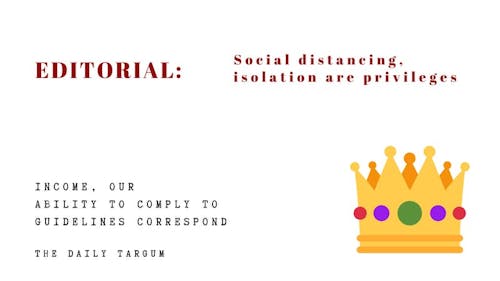EDITORIAL: Social distancing, isolation are privileges

While social distancing has been hailed as a must-do for everyone in American society today, the unfortunate reality is that not everyone has the ability or fortune to hole themselves up for an extended period of time.
It all comes down to social and economic class. There are those who have enough money saved up or wealth amassed so that they can afford to forgo their income for an undetermined period of time (though as that amount of time extends, the number of people able to remain inside will dwindle).
Those with enough liquid wealth to maintain their standard of living throughout this period of encapsulation are privileged. In many of those cases it may be earned privilege, but it is still privilege nonetheless.
Blue collar workers, who tend to make less money under normal times, are disadvantaged by this as well. Construction workers, for instance, cannot simply cease their projects and disregard their jobs due to the pandemic. Blue collar workers, if they have not been fired due to the fiscal pressures of this outbreak, have to keep working to maintain their wages.
The necessity to continue working stems from the fact that many of these workers make hourly wages. They make no money if they are not working. They do not have the privilege of pay if they are not physically on the job.
Unlike workers whose jobs can be transitioned to online interfaces fairly easily, low-income workers are at a higher risk for termination — if not now, then in the weeks and months ahead. High level employees, who can have their work transitioned online, will, logically speaking, be spared the worst of these lockdown measures. But low-income workers seldom have work that can be moved online.
Smaller shops, such as local retail businesses which often have low-income employees, cannot operate their businesses online and have been effectively stripped of their revenue streams. Those shop owners — and their workers — have to keep going into work if they want to financially survive this outbreak.
But the true privilege is at the individual level. Wealthy people with spacious houses will naturally fair far better during this isolation period than those living with five children in a cramped apartment. The wealthy also have a greater ability to distance themselves from ill family members than those in more cramped living spaces.
Self-employed workers, as well as those who work less formal jobs (especially undocumented workers), are also at high-risk of the coronavirus disease (COVID-19), as they are less likely to have workplace protections and more likely to be forced to continue working.
The tools that enable someone to socially distance are all byproducts of irrefutable privilege. The socially distant person must have enough money not to work or a job that allows them to work online (and high-speed internet is also a mark of privilege). They must have enough space to make isolation a realistic thing to do. They must have access to food nearby, the amenities needed for cooking and enough entertainment to keep them sane. These things, too, are a mark of privilege.
Social distancing is also legitimately impossible for some. Refugees detained in camps, those in detention centers and prisoners are being forced to expose themselves to this potentially deadly virus.
Being prepared for a future pandemic is, to the surprise of absolutely no one, a major collective discussion lately. That discussion generally veers toward the importance of doctors, nurses, hospitals and medical supplies. That is all for good reason — those members of society are vital for combating future outbreaks.
But the reform cannot stop there. Future legislation and norms must be geared toward making workers less susceptible in times of panic and more equipped to social distance should it come to this again. After all, all the medical expertise in the world failed to prevent this outbreak and a vaccine is still a long way out.
Those reforms include guaranteeing full wages for low-income workers displaced by any sort of future calamity, guaranteed sick leave, parental leave and assuring high quality medical care for workers at all income levels.
There are also actions we can all take right now. If you have to go to the supermarket or other stores that continue to work their employees, follow guidelines and distance yourself from everyone — especially those working. Do not put them at risk simply because they need to take home money for them and their families.
Businesses that are still having their employees work should also provide hazard pay to them for working amid a pandemic. Businesses are also going through tough times, though, so the government should step in and subsidize those who continue to work with extra money. They are doing us a great service by keeping our way of life somewhat functional during these times.
Stemming from that, donating has never been more important.
Before you chastise someone for not socially distancing, realize that not everyone has the privilege to do so. If you cannot social distance, use the resources you can to make it through these times and know that we are with you.
The Daily Targum's editorials represent the views of the majority of the 152nd editorial board. Columns, cartoons and letters do not necessarily reflect the views of the Targum Publishing Company or its staff.



